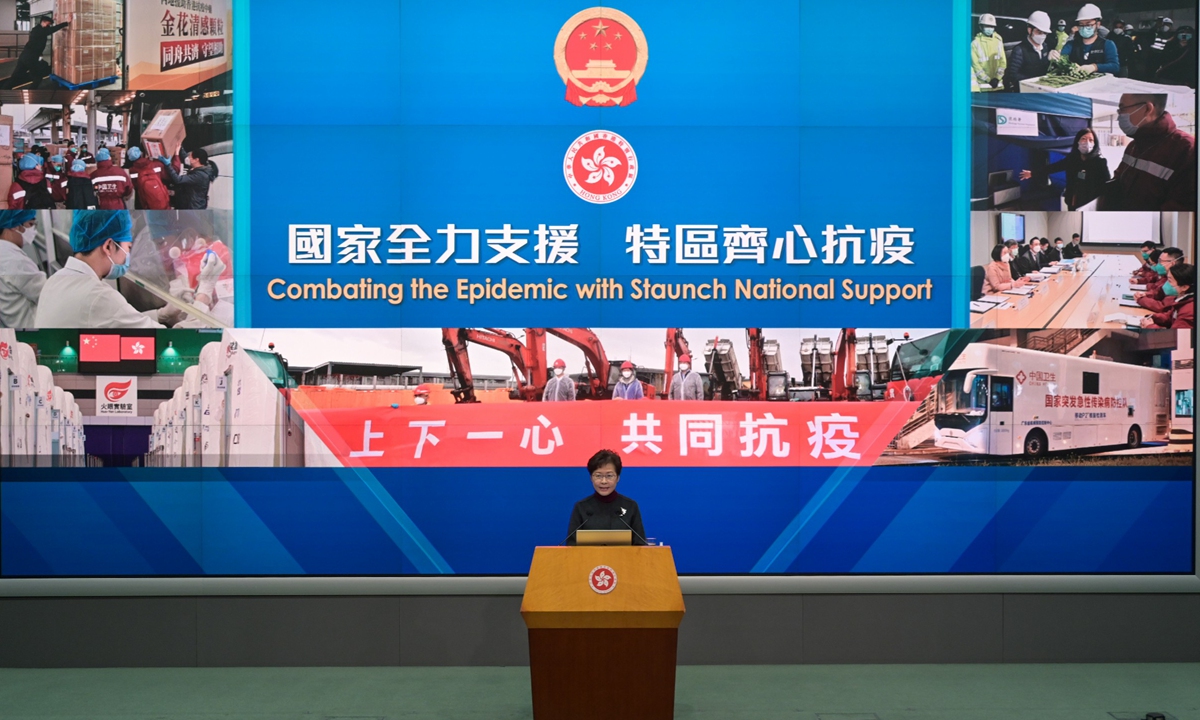
HKSAR chief executive Carrie Lam holds a press briefing on February 22, 2022, announcing that Hong Kong will launch mandatory mass nucleic acid testing in March for its residents, who are expected to receive COVID-19 tests three times within the period. Photo: VCG
Hong Kong will launch mandatory mass nucleic acid testing in March for its 7.3 million residents, who are expected to receive COVID-19 tests three times within the period, the Hong Kong Special Administrative Region (HKSAR) government announced on Tuesday.
It also vowed to make the use of the next two to three months - considered a critical period for containing the current outbreak - in setting up efforts to combat the virus spread with measures such as maintaining social distancing and increasing quarantine places.
The fifth wave of the COVID-19 has continued to worsen in Hong Kong as the Chinese city reported daily new cases of more than 6,000 for the third consecutive day, with 32 new deaths registered on Tuesday, media reported. The number of confirmed cases has increased about 64-fold since early February.
Faced with the surging new cases and death toll, HKSAR chief executive Carrie Lam told a press briefing on Tuesday that the next two to three months are a critical period, and a large part of social distancing measures and rigorous anti-epidemic measures such as early medical treatment of patients, tight control on borders and accelerating vaccination will continue until mid to late April.
Students in kindergarten, elementary and secondary schools will have their summer holiday moved to March and April while their campuses may be used as test and vaccination centers, Lam said.
The implementation of compulsory universal testing, and undertaking hundreds of nucleic acid testing centers across the city will take place in March, and it's mandatory for all residents based on the year of birth. "The measure has legal effect with penalty mechanism," Lam said.
The central government has stepped up its assistance to Hong Kong, including increasing the number of daily tests, sending medical teams and testing supplies, building Fangcang makeshift hospitals, and ensuring daily necessities.
With the help of the central government and local testing providers, Hong Kong will get at least one million tests a day, and the HKSAR government is establishing hundreds of testing centers across the city. The city spent two weeks testing about 1.78 million people in 2020 amid a COVID-19 resurgence.
Hong Kong medical professionals voiced their support to the upcoming citywide nucleic acid testing, saying it could help Hong Kong detect new cases more rapidly to bring the epidemic under control soonest.
Leung Chi-chiu, a respiratory disease expert and former chairman of the Hong Kong Medical Association's advisory committee on communicable diseases, told the Global Times on Tuesday that citywide testing is an important tool to find all cases, especially those with very mild or no symptoms, to slow down the spread of the virus.
But he said that the government has to consider manpower and the capacity of quarantine facilities, and locate, treat and quarantine new cases in a timely manner. Otherwise, the testing would not achieve its desired results.
Lam admitted that there are probably about 30,000 confirmed or preliminarily confirmed patients who are still waiting to be treated in hospitals or be quarantined.
The four Fangcang makeshift hospitals supported by the central government are being constructed in Tsing Yi, Yuen Long and Hung Shui Kiu, which are expected to provide 14,000 to 17,000 quarantine places for Hong Kong. The one in Tsing Yi would be put into use in a week.
Lam also told the press on Tuesday that the HKSAR government will add another treatment center in Shek Kip Mei Park sports stadium. The central government agreed to construct emergency hospitals in Lok Ma Chau Loop.
In March, it's expected to add over 16,000 quarantine places for communities like quarantine hotels and quarantine facilities transformed from Kai Tak Cruise Terminal facilities.
On why the HKSAR government won't have launched citywide mass testing as soon as possible, Tam Yiu-chung, a member of China's National People's Congress Standing Committee from Hong Kong, told the Global Times on Tuesday that the authorities need to fully prepare the manpower and equipment.
"Compared to the situation in the mainland, the epidemic in Hong Kong had eased for a while in the past, which made HKSAR authorities and society let their guard down. The sudden resurgence led to chaotic scenes," Tam said, noting that we have to admit that there are loopholes in the anti-epidemic work in Hong Kong.
With daily new cases continuing to break records, Hong Kong faces a severe situation that no other Chinese mainland cities may have experienced, Leung said, noting that the scale of the COVID-19 in Hong Kong is nearly 100 times that of Xi'an in December 2021. When Xi'an brought the epidemic under control after around 40 days, it reported 2,080 cases, less than half of Hong Kong's daily new cases.
Responding to whether the central government instructed Hong Kong to implement a lockdown, Lam told reporters on Tuesday that there's no such instruction from the central government, nor instruction on any specific anti-epidemic measures. The central government supported the HKSAR government to take charge primarily.
A citywide lockdown may not work well in Hong Kong as there's no way for Hong Kong to control the COVID-19 in two weeks, which is the usual length of a lockdown, and Hong Kong's economy and people's livelihood cannot afford more than two weeks, Leung said, noting the city does not have a strong community-based management to ensure the order of the lockdown.



